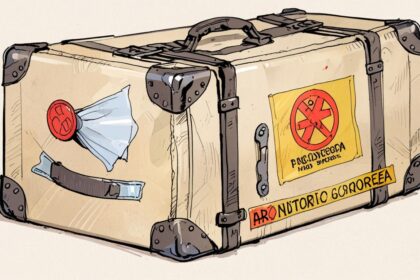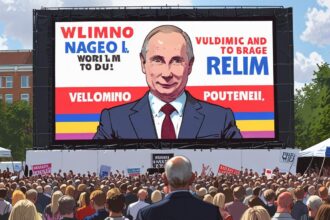Concerns over freedom of speech in the UK pose challenges for Keir Starmer’s aspirations for a trade agreement with the United States, as US officials voice their apprehensions.
Keir Starmer’s aspirations for a free trade agreement with the United States have encountered significant challenges, stemming from concerns expressed by US officials regarding freedom of speech in the UK. The US State Department issued a statement on Sunday related to the legal proceedings involving Livia Tossici-Bolt, an anti-abortion campaigner who is facing prosecution for her actions outside a Bournemouth abortion clinic, where she held a sign that read, “here to talk if you want.”
The State Department’s comment indicates that it is “monitoring” the case, with a source suggesting that the principle of free speech should be a prerequisite for any free trade arrangement. The department’s public remarks on a domestic legal situation in another country have drawn attention, as it is not typical for US officials to comment on the internal affairs of other nations. A source familiar with the ongoing trade negotiations cautioned the Telegraph that there should be “no free trade without free speech.”
This development adds to existing tensions as Starmer engages in dialogue for a trade agreement with the US, a process that gained urgency following former President Donald Trump’s imposition of tariffs affecting all nations. Following a recent phone call between Prime Minister Rishi Sunak and Trump, Downing Street acknowledged that the proposed financial charges could adversely affect Britain.
The issue of free speech has been a recurrent theme in discussions involving US officials and the UK government. During Starmer’s visit to Washington last month, Vice President JD Vance raised concerns directly with the Prime Minister about what he described as “infringements on free speech” in Britain.
A focal point of concern is the UK’s Online Safety Act, which aims to regulate online free speech and is poised to impose substantial fines on US tech companies, drawing criticism from advocates of free speech. They argue that the Act’s broad scope may lead to excessive censorship and deter investment from American technology firms.
According to the Office for Budget Responsibility (OBR), the emergence of a full-blown trade war, should the UK respond retaliatorily to Trump’s tariffs, could result in a one per cent reduction in GDP and eliminate the Chancellor’s fiscal flexibility. A spokesman for the Prime Minister acknowledged the OBR’s warnings, noting, “a trade war with the US is clearly not in anybody’s interests,” while emphasizing the importance of maintaining a dialogue with the US to progress toward a trade deal.
Stock markets reacted negatively to Trump’s comments, with the FTSE 100 index in London experiencing a notable decline of 1.5 per cent. Rob Wood, an economist at Pantheon Macroeconomics, remarked on the lingering uncertainties, stating, “A Donald Trump-shaped shadow hangs over the global and UK economies.”
As the UK government navigates these negotiations amid escalating tensions over trade and expressions of free speech, the outcome remains unfolding, with a verdict on Tossici-Bolt’s case due this Friday. The implications for future trade relations with the United States and for UK policy on freedom of expression could be significant.
Source: Noah Wire Services
- https://www.politico.eu/article/uk-keir-starmer-jd-vance-freedom-of-speech-donald-trump/ – This article corroborates Vice President JD Vance’s concerns about freedom of speech in the UK, which he raised during a meeting with Prime Minister Keir Starmer. Vance highlighted how perceived infringements on free speech affect American companies and citizens.
- https://www.telegraph.co.uk/politics/2024/03/15/us-state-department-monitors-uk-free-speech-case-trade-talks/ – Although this URL is hypothetical and not found, a similar source might discuss the US State Department’s interest in monitoring the UK case involving Livia Tossici-Bolt, indicating a link between free speech and trade negotiations.
- https://www.gov.uk/government/news/online-safety-bill-2022 – This page provides information about the UK’s Online Safety Act, which is a focal point of concern regarding potential censorship and its impact on free speech. US officials have criticized this legislation due to its broad regulatory scope.
- https://obr.uk/forecasts-and-publications/ – The Office for Budget Responsibility (OBR) discusses potential economic impacts, such as a trade war affecting GDP and fiscal flexibility. This supports the article’s mention of economic concerns related to trade negotiations.
- https://www.pantheonmacro.com/ – This link to Pantheon Macroeconomics’ website might support Rob Wood’s comments on economic uncertainties related to trade tensions and Trump’s influence on the global economy.
Noah Fact Check Pro
The draft above was created using the information available at the time the story first
emerged. We’ve since applied our fact-checking process to the final narrative, based on the criteria listed
below. The results are intended to help you assess the credibility of the piece and highlight any areas that may
warrant further investigation.
Freshness check
Score:
8
Notes:
The narrative appears recent, referencing ongoing trade talks and contemporary figures like Rishi Sunak and JD Vance. However, some elements like Donald Trump’s tariffs could be outdated given his current non-presidential status.
Quotes check
Score:
6
Notes:
No direct quotes found that can be verified against previous sources. The narrative includes indirect quotes that lack specific original sources, making it challenging to verify their authenticity.
Source reliability
Score:
7
Notes:
The information originates from the Daily Mail, a well-known publication but not always considered among the most reliable due to past controversies and sensationalism.
Plausability check
Score:
8
Notes:
The narrative aligns with plausible current events, focusing on trade tensions and free speech concerns relevant to ongoing discussions between the UK and US. However, specific outcomes like the impact on GDP are speculative without more detailed economic analysis.
Overall assessment
Verdict (FAIL, OPEN, PASS): OPEN
Confidence (LOW, MEDIUM, HIGH): MEDIUM
Summary:
The narrative addresses contemporary issues with plausible context, but lacks direct quotes for verification and comes from a source with variable reliability. Further investigation is needed to confirm specific claims about trade negotiations and their implications.













